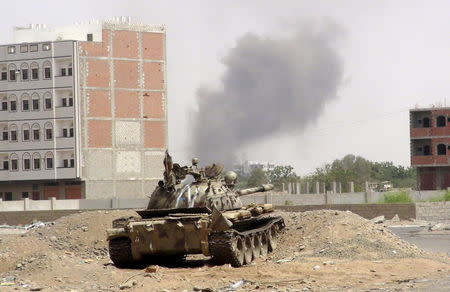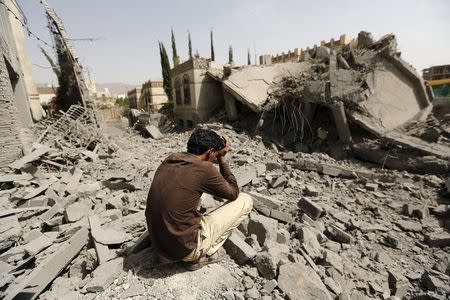Yemeni parties agree need for ceasefire, not yet on details: delegate
By Stephanie Nebehay and Tom Miles GENEVA (Reuters) - Yemen's warring parties have agreed at U.N.-sponsored peace talks on the need for a ceasefire but the details remain under discussion, a delegate to the discussions said on Tuesday. The U.N. special envoy to Yemen, Ismail Ould Cheikh Ahmed, began shuttle diplomacy in Geneva trying to bridge differences between various political factions. But they still refused to sit at the same table and spelled out clashing agendas. Yemen's civil war flared after Iranian-backed Houthi forces captured the capital Sanaa last September and thrust south and eastwards across the country, driving President Abd-Rabbu Mansour Hadi into exile. The conflict escalated in March when a Saudi-led Arab alliance began air strikes on the Houthis. Although the war is rooted in local rivalries, it also reflects a wider regional struggle between Sunni Muslim Saudi Arabia and Shi'ite Iran. U.N. Secretary-General Ban Ki-moon formally opened the Geneva parley on Monday calling for a humanitarian truce in Yemen, already suffering severe poverty and unemployment, to coincide with the start of the Muslim holy month of Ramadan. Ghaleb Al-Mutlak, from the south Yemeni separatist Herak movement, said the proposed ceasefire would run for one month and also halt Saudi-led bombings on the Houthis and allied army units loyal to former president Ali Abdullah Saleh. "We're all in agreement about the need for the ceasefire, but we're still discussing details," Mutlak told reporters after Houthi envoys held their first talks with Ould Cheikh Ahmed. "It seems that there is a readiness on behalf of all parties including Saudi Arabia but the details of this agreement are under discussion." "We should not underestimate the significance of this event," Ould Cheikh Ahmed told reporters at the end of Tuesday's discussions. "It is the important start towards the return to a political process" but it would be a difficult path. The Houthis say they are battling a corrupt government and Islamist militants, and deny receiving any military or economic support from Iran, which also says it provides them only diplomatic backing. Saudi Arabia wants to roll back the territorial gains of the Houthis, who it regards as a threatening proxy for Iran, and revive a Gulf-backed political process aimed at creating a representative Yemeni government. The United Nations says that more than 2,600 people have been killed in the violence since March 19. LOW EXPECTATIONS Although both sides set out low expectations for the talks, likely to run for 2-3 days in the Swiss lakeside city, the head of the Houthi delegation appeared upbeat. "We believe that these ... these comprehensive consultations will lead to an understanding of the foundations for the start of political dialogue," Hamza al-Houthi told Reuters. However, in a televised speech on Tuesday, Abdel-Malek al-Houthi, leader of the Houthi Ansarullah group, said that while a political solution was possible, prospects were being spoiled by Saudi involvement. He accused his opponents of using the United Nations as a tool to advance Riyadh's agenda. "There is nothing hindering a political solution in the country; the solution is available but they (Saudis) are the ones who ruin it with their aggression," he said. Hadi, for his part, said in Saudi Arabia that the talks must focus only on implementing a U.N. Security Council resolution mandating the Houthis to vacate cities seized since last year. "We will not accept under any condition to go back to square one which talks about resuming previous dialogue under the threat of violence," he told a meeting of the pan-Islamic Organisation of Islamic Cooperation. The fighting has deepened a humanitarian crisis. The Houthi-run Saba news agency said four women and one child from the same family were killed on Tuesday when a Saudi-led air raid hit a girls school in the central city of Taiz. The report could not be independently verified. U.N. Human Rights spokesman Rupert Colville said the total number of civilians killed since March 26 was at least 1,412, including 210 women, with a further 3,423 injured. "It's been 80 days of chaos, death and destruction in Yemen," Robert Mardini, Middle East regional director of the International Committee of the Red Cross. "Ahead of the holy month of Ramadan, there is really little hope for the people of Yemen." (Additional reporting by Mohammed Ghobari in Sanaa and Lara Sukhtian in Geneva; Writing by Sami Aboudi; Editing by Mark Heinrich)


